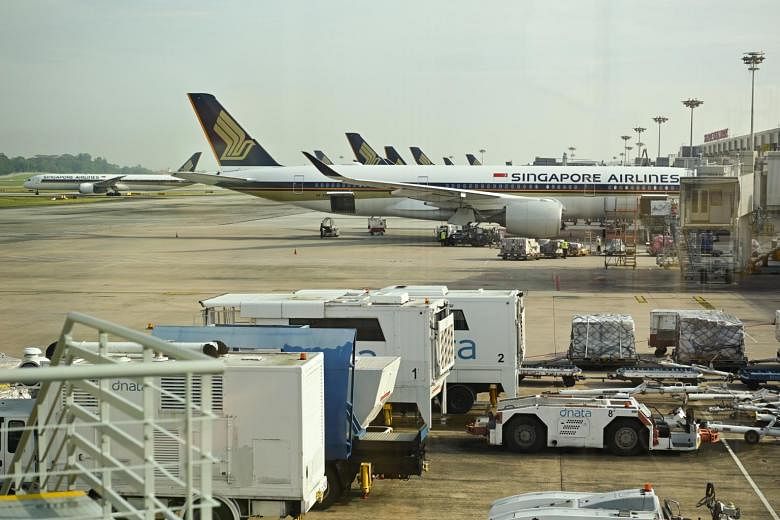SINGAPORE - Airlines that have continued to hedge fuel now have some buffer against the impact of soaring oil prices.
They had previously suffered massive hedging losses when oil prices sank at the beginning of the Covid-19 pandemic two years ago.
They include Singapore Airlines (SIA) and Australia's Qantas, which had earlier locked in part of their future fuel needs at lower prices.
Meanwhile, some airlines that have not hedged fuel are instead turning to fuel surcharges to cushion the increased costs.
But experts have said that the continually rising prices triggered by Russia's invasion of Ukraine will leave all airlines in a pickle moving forward. So carriers that have said they would boost capacity may have to scale back their plans.
Russia, a major oil and natural gas producer, has been hit by tough sanctions since late last month.
A ban by the United States and Britain on the import of Russian oil, and concerns that the European Union might follow suit, had caused oil prices to rise sharply.
Global crude oil benchmark Brent is currently trading at about US$112 a barrel, having surged to a a 13-year high of more than US$130 last week.
Independent aviation analyst Brendan Sobie from Sobie Aviation said the high fuel prices will bump up the variable costs, or the additional cost of a plane taking to the skies.
"Some airlines that were generally keen to add back capacity as international travel recovers will now have to think more carefully about adding back capacity, as it will be harder to cover variable costs," said Mr Sobie.
"So we may see many airlines in this region, excluding Singapore-based carriers, not add back capacity as aggressively as they would have without the recent spike in fuel prices."
He added that historically, higher fuel prices do not always lead to higher fares, given that airfares are determined by supply and demand.
But Mr Mayur Patel, head of Asia at flight data and analytics provider OAG Aviation, said airlines, despite some being well hedged for the coming months, cannot absorb the higher fuel price. This is because oil prices have gone up by nearly 60 per cent in the last 12 months.
"Airlines can raise the airfare and introduce fuel surcharge to flight bookings to recoup some of the costs against high fuel price," said Mr Patel.
"However, this can have an impact on bookings if the fares or surcharges are set too high."
The International Air Transport Association said it expects upward pressures on oil prices to continue, especially if stricter sanctions were applied to the Russian energy sector.
"All airlines that have some unhedged fuel demand will be directly impacted," it added.
The SIA Group, which comprises SIA and budget carrier Scoot, said it has hedged up to 40 per cent of its fuel requirements for the period up to the first quarter of its 2023/24 financial year. This has been done at an average hedged price of up to US$60 per barrel for Brent crude.
It said in its quarterly financial report last month that its net fuel cost rose to $633 million, largely owing to higher fuel prices and more planes taking to the skies. But its fuel hedging position had partially offset the increased fuel costs to the tune of $144 million.
Hong Kong carrier Cathay Pacific, which is operating at a small fraction of what it did before the pandemic, said it has hedged all its required fuel needs for the first quarter of this year.
This progressively lowers till the fourth quarter of 2023, up to an average price of about US$70.
Meanwhile, Qantas Group chief financial officer Vanessa Hudson said the business is "really well covered" for the first half of the current financial year in spite of fuel prices spiking.
The group has a hedging position covering 90 per cent of its flights for the first half of its financial year ending June 30. Its hedging gradually declines in the second half of the year, Ms Hudson added.
Philippines budget carrier Cebu Pacific said it currently has no outstanding oil hedges in place but is monitoring prices as well as opportunities.
The carrier had introduced fuel surcharges in July last year.
Malaysian budget carrier AirAsia had on March 5 announced fuel surcharges as well to offset escalating jet fuel prices.
The surcharge starts at RM10 (S$3.24) for domestic routes, and goes up to RM60 for international routes exceeding four hours.
Mr Sobie said that ultimately, fuel hedging strategies are long-term strategies that are not supposed to change when fuel prices increase or decrease.
But the pandemic, which was an extremely unusual event, had triggered some airlines to stop hedging, he noted.
"Of course, high prices make airlines that hedge look smart. But over time, prices go down as much as they go up," he said.
"So I don't think it's smart to assume the recent spike in fuel prices shows airlines should be doing hedging more frequently again."


